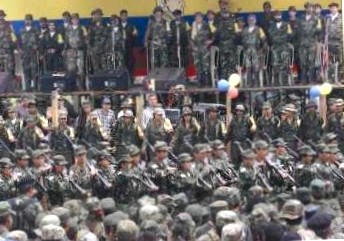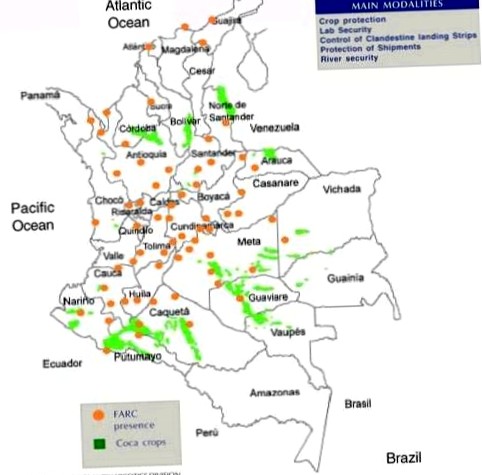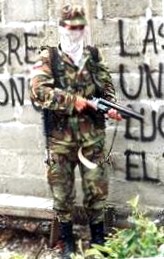After years of militar aid, the Colombian army is now available for offensive. Encouragement come from Washington, on the other hand, warnings of human rights organizations from Germany and abroad
Years of negotiations between the Colombian government and the revolutionary disputes of Colombia (FARC failed. After the resumption of the talk with the organization on the 3. January of this year, the Colombian government under the conservative President Andres Pastrana has linked the peace process in the mid-past week. Tag-wide United Nations special sentiment attempts, James Lemoyne, remained unsuccessful.

The photo shows the FARC in May 2001 in the basic "Bolivarian movement for a new Colombia" In San Vicente de Caguan
On Saturday evening, the Pastrana declared final a 48-hour ultimatum. Until Monday evening, 21.30 o’clock (local time) should be up to 20.000 Having regard to the largest guerraceorganization of Latin America the demilitarized zone from the coarse of Switzerland. That "Peaceful laboratory" was established in November 1998, the army’s jerk of the army had laid the foundation for the political solution of the armed conflict on the political solution since 1964.
Andres Pastrana relied in a speech on the nation on Wednesday evening on the chief underhandler Camilo Gomez and explained, the FARC had left the negotiating table from his own will and the dialogue is thus confused. The presentation was revoked after a communique of the FARC in the night from Saturday to Sunday. Fortan strolled, the position of the FARC was too relentable. The key orders of the group called Pastrana as "not trustworthy". The demand of the FARC, the increasing military preaching to reduce the zone is to Pastrana "not negotiable".
Immediately after the termination of the speech, the prassident met with the High Command of the Colombian Army. For several months, the generals had remedied prere on Pastrana and requires a military solution in the war with the FARC and the National Liberation Arm (ELN).
Army ready for war
Already at the beginning of August, the army against the commutations of a political solution prevailed and got free hand for a coarse offensive against the FARC. In the course of this "Operation 7. August" were around 1 in the Gauviare region.500 guerrilla farmers in battles with around 3.000 soldiers involved. After this large military offensive for years, in which for the first time "Black-Hawk"-Fighting helicopters of the USA were used, the High Command of the FARC broke the speech with the government.
Prassident Andres Pastrana explains ultimatum
Supported by years of militar assistance from the US and motivated by the "Fight against terrorism", With which the Colombian Guerrilla in the Visor Washington, the Militarlobby has now been finalized (Colombia equal Afghanistan?To). It is perfectly rusted: In addition to a billion dollar, Washington has provided Washington for the so-called Colombiaplan, the army was also promised by the Army in recent weeks. According to General Jorge Mora Rangel is the Colombian Army "to war against the guerrilla ready". According to Mora, the number of soldiers has been increased from 60000 to 110000 since 1998. The end of this year will be 140000 men in weapons, they have 172 transport and combat helicopters.
Material and financial support from the USA the Colombian army was completely umused with the help of Washington in recent years. Smaller and more flexible units should be more effective against the FARC guerilla. Although it sees itself as a classic army, the military strategy is based on small, usually independent units. In addition to combat helicopters, the army also relies on aircraft with infrared scanners and radar sensors to track movements on the ground.
In recent years, the two coarse guerilla groups of Colombia, Farc and "National liberation army" (Eln) massive inflow, after presentation of the CIA also obtained from neighboring countries. The efforts of the High Command of the FARC to acquire new tactics resulted in military successes. In August, three members of the IRA were arrested by Colombian security forces who should have trained FARC units (Pastrana’s war). The group has always been accused of using the zone under its administration to launch attacks from there.
surprise comes the step of Pastrana anyway, because a crisis was predicted to the peace process only for the end of May. Then in Colombia, the Prassidalection is. The candidates of the two large parties welcomed the decision of Pastranas. The Prasident Warter of the Conservative Party, Alvaro Uribe, explained the abort of peace negotiations as "necessary to protect people in the area". Horacio Serpa, the prospective candidate of the Liberal Party, rally, he will "Next for Colombia". This threat is probably to take.
After consultation of David Shutter from the University of Miami Bogota can "The full support in the fight against the FARC counts, which is also on the terrorist list of Washington". However, the US government expect fast results, Prasident Pastrana stands, so Shutter, under a huge prere. Analist of "Center for International Policy" (CIP) are now based on a stronger weighting of the heavily discussed Colombian.
Guerrilla prepared for advice of the army
as "Result of a long-term plan for the escalation of the war" was the demolition of the talk of the FARC. "None of the two points of the Joint Agenda was fulfilled, and concrete talks about it was avoided", said a commander of the group on Thursday. The fault for the failure of the speech is therefore to be looking for the government alone, her subhandler Camilo Gomez has lied to the nation when he explained the FARC for the demolition responsible.

In fact, the demands of both sides ran increasingly. While the government continued to a rapid termination of the war, the FARC will exist on social and political reforms in the Sud American country. But to enforce the strong economic stakeholders, but also were hardly possible for a peaceful government. The example of the Central American Guatemalas will show the opportunities for such a negotiations in a bad light. The national revolutionary unity active there (URNG had signed a comprehensive peace agreement for five years and filed the weapons. Today, the agreement itself is considered failed in UN circles than in almost all points. The social reforms remained, the political violence, however, is unbroken. These experiences also influence the negotiations in Colombia.

Member of the paramilitarian association
Even if the FARC continues to be on one "correction" the government decision hoped, point the signs in a different direction. BBC and CNN at least told the weekend week unison "The bloodiest year in the Colombian Burger War" in advance. Meanwhile, it strolled in the FARC, one would not give a step before the suspected offensive of the army in the zone. Only from the 15.000 inhabitant small town of San Vicente de Caguan became the guerrilla units in the mountains. "To protect the civilian vacation", Like a militar exhibition of the group explains.
The daily El Tiempo refers to information from army circles, according to which the FARC had the boundaries of Zone to stop a possibly advice of the troops. The newspaper quotes a relief of the group with the comments that are FARC units "Twenty kilometers behind San Vicente in the mountains" for sure.
Whole country in the emergency state
Since the demolition of peace negotiations with the FARC, Colombia is in the emergency state. According to General Fernando Tapias, the High Commander of the Colombian Army, are up to 4.000 soldiers posted around the zone. "We only wait for the Order of Prasident Pastrana to start the offensive", declared tapias on Sunday. 4.500 soldiers of the "Fast engagement force" operated by the assisted by Washington military object Tres Esquinas. These troops stand 35 "Black-Hawk"-Battle helicopters are available, ten of which have arrived from the USA last week.
Black-Hawk
The invitation of the UN Special sentiment Lemoyne to pay attention to military actions, obviously no obedient is given in Colombia. According to press surveys, between eighty and ninety percent of respondents are against a continuing of the negotiations, because no one is familiar in a political solution. These survey results are repeatedly caught up by baffles of a military solution. However, it should be noted that the press in Colombia is in the hand of some less mediamogule, which are hardly interested in enforcing the social reforms required by the Guerilla and performed regular campaigns against political solution.
Not only in the villages of the demilitarized zone prevails in these days tense tranquility, also the capital Bogota stands quasi under militar cast. Despite the envision, to draw himself from the city, the government also suspects support for Guerrilla. Especially in the sights are the universities of the country.
Social groups and human rights organizations were concerned about the development. The Colombian army stands under stable accusation of working with paramilitarian units. In the past, the army has been accused of bringing back after an offensive for a few hours to leave the paramilitarian groups free in the resulting power vacuum. In particular, people who are daily to cooperate with the Guerilla are visible. But that can also be the small handler who sold the groups sold some sacke beans. The nervous in the now no longer long-demilitarized zone is lacking against this background.
Today, the FARCs want the demilitarized zone in one "public nude" put down and then pull back into the mountains.